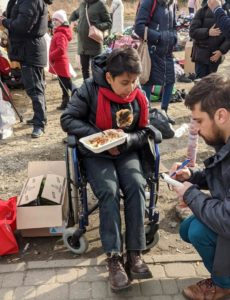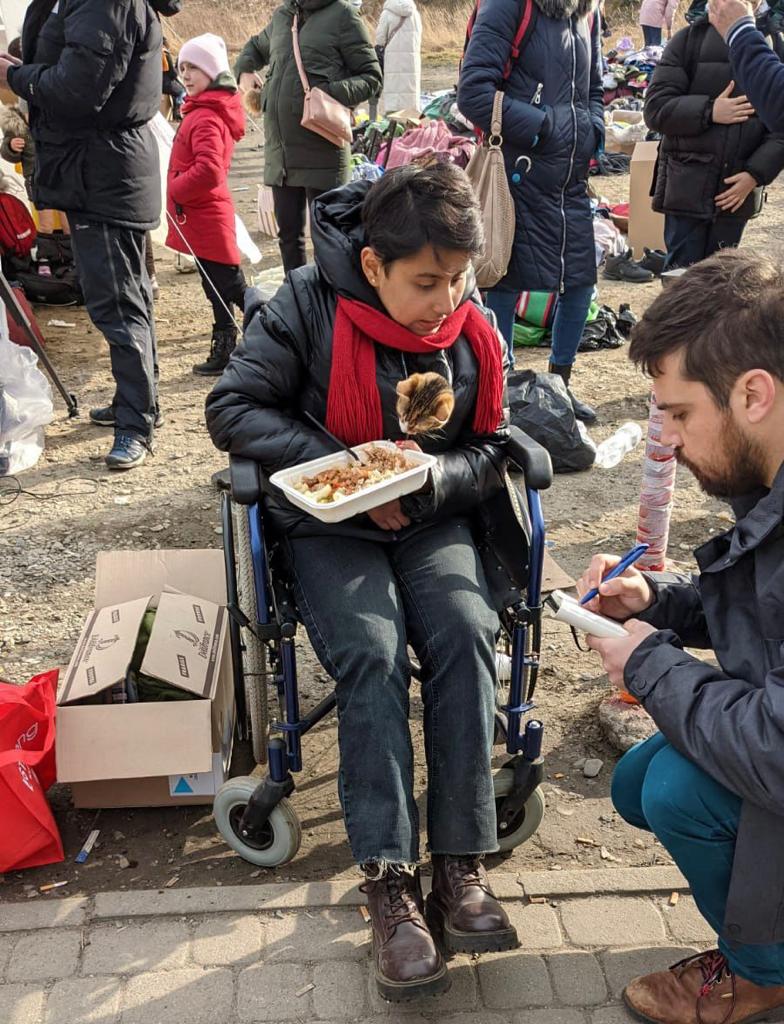They’re arriving with dogs on leads, cats in their arms, or struggling to carry animals in baskets, not wanting to leave any family member behind. PETA Germany is working on the border between Poland and Ukraine and has never seen anything like it. The conditions are dire. People who have travelled for days have had to stand in 30-hour queues, many with their animals, in the freezing cold and snow, without food or water. But for these refugees, their animal companions are family and leaving them behind is unthinkable.
Hundreds of thousands of people are fleeing Ukraine on foot, in cars, and on trains and buses. They’ve lost almost everything except each other. After such long journeys, feeding themselves and their animals with whatever they can find, separating them would be beyond cruel.
Many EU countries have now loosened the requirements for animals entering to be vaccinated, microchipped, and have had a recent rabies antibody test, but not the UK. Any refugees hoping to come here to stay with family would have to abandon their beloved animal companions, which many would never do, leaving these families with nowhere to go. There’s enough inhumanity in this dreadful war without the UK adding to it.
One Ukrainian woman stumbled to the border with her cat companion, Crimsee, huddled in her arms. He was her world, and she couldn’t leave him behind to fend for himself as bullets and bombs rained down. So she’d carried him every step of the 37 miles to the Polish border.



Credit – PETA
When staff from PETA Germany found her, she was barely able to stand, still clinging to Crimsee, who was tucked inside her coat. The team provided her with food, water, and a bed to sleep in and helped with the paperwork so that they could stay together in Poland as they embark on their uncertain future as refugees.
PETA is urging anyone who flees their home to take their animal companions with them. They are entirely dependent on their human family for survival and security. Our partners in Romania are offering to vaccinate dogs and cats free of charge, carry out necessary blood tests, and provide the animals with sufficient food and veterinary care, and many countries are stepping up in this hour of need with similar offers. Meanwhile, this morning, PETA Germany managed to get across the border into Ukraine with 20 tonnes of food and other supplies for shelters, where brave workers have refused to leave but have run out of everything.
Animals, like human civilians, do not wage war, yet they are often among the worst affected, which is why the UK must factor them into our humanitarian response. By setting up controlled entry for non-vaccinated and non-microchipped animals, the UK could eliminate any risk of rabies, and after a period of quarantine, the animals could be reunited with their beloved families.
In these desperately difficult circumstances, it would be unconscionable not to offer whole families, including their animal companions, refuge in the UK. Not doing so is not only costing other animals their lives but also risking human lives. Last night, I heard from a woman desperate for her mother to join her in the UK, but she is refusing to leave without their family’s dog.

Credit – PETA
Exceptional circumstances require exceptional and rapid action. The Department for Environment, Food & Rural Affairs must act now to temporarily suspend legal entry requirements in order to help save as many lives as possible.
Mimi Bekhechi is vice president, UK, Europe and Australia, of PETA UK.












